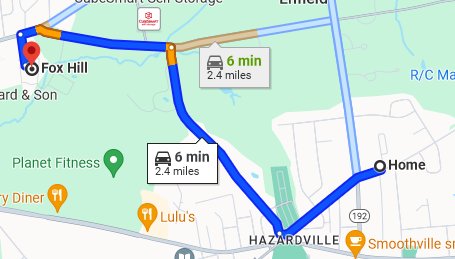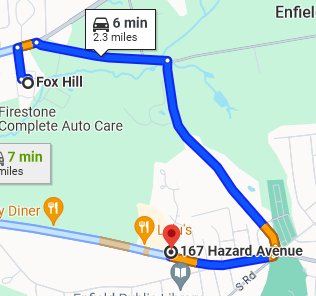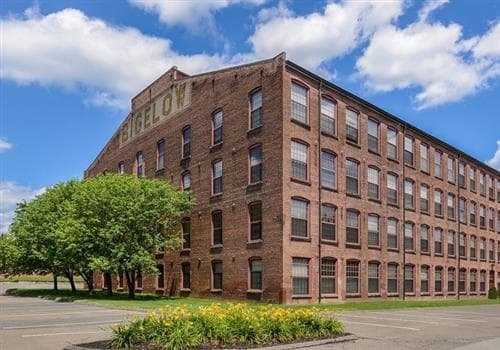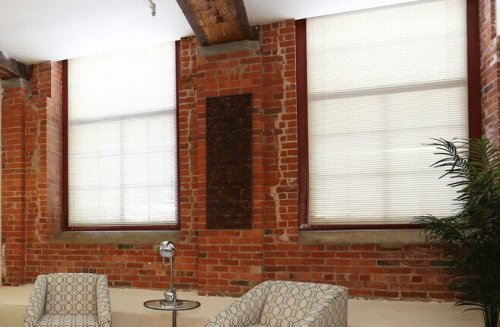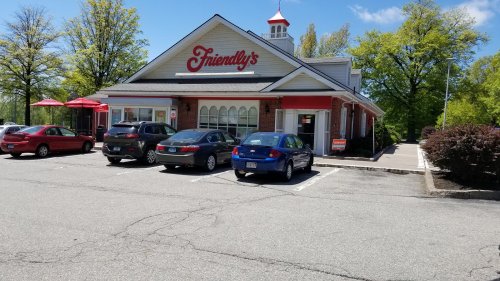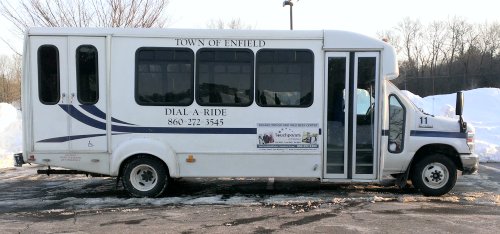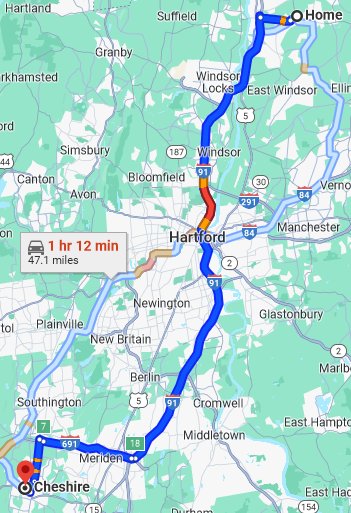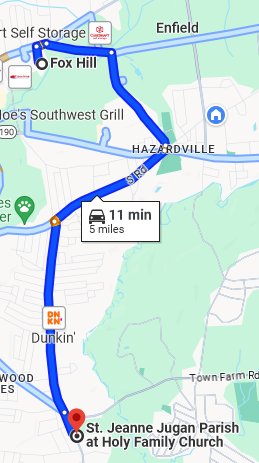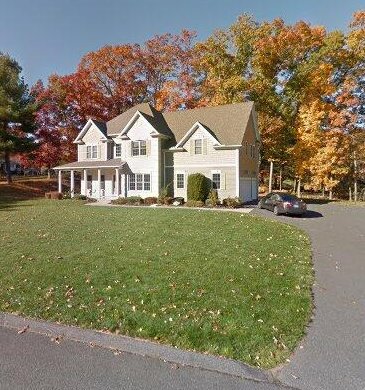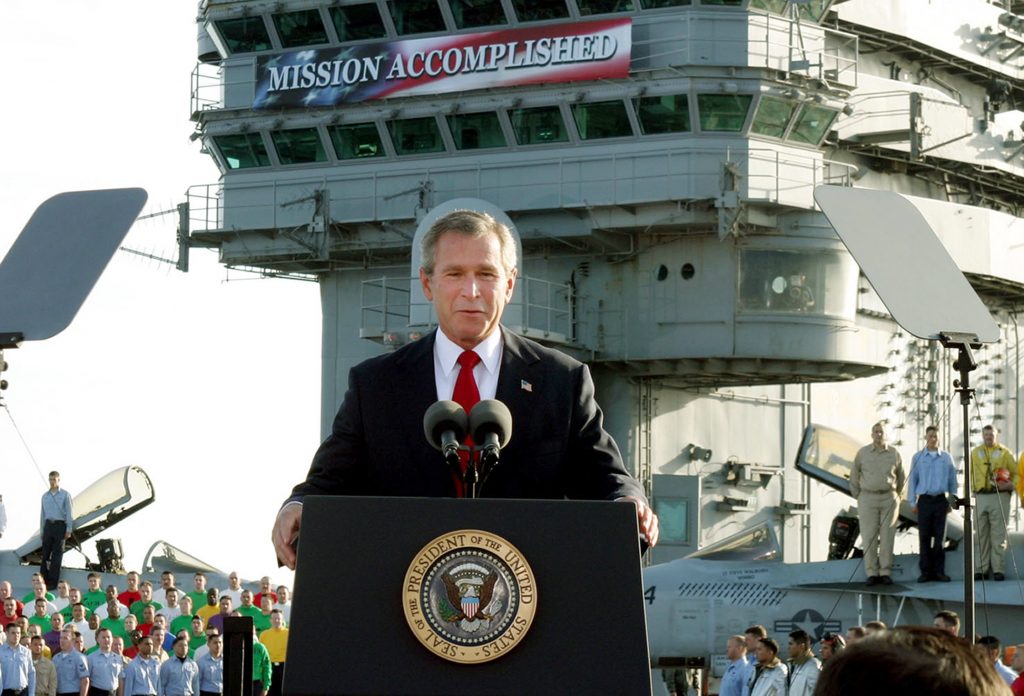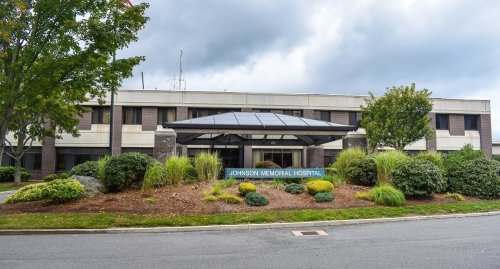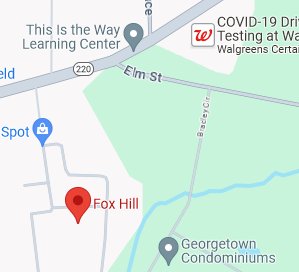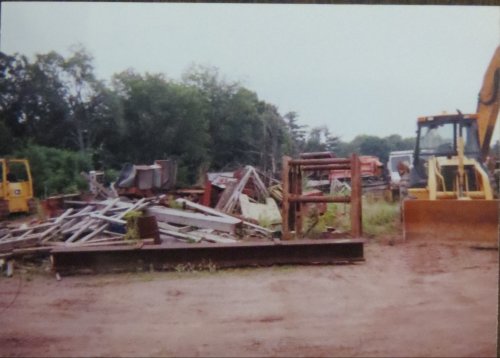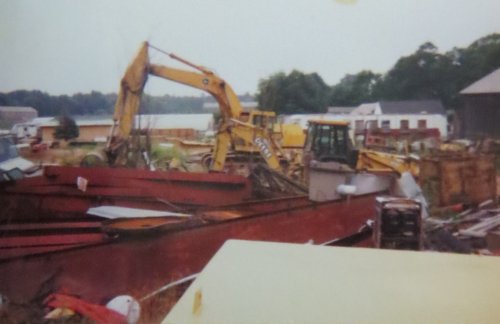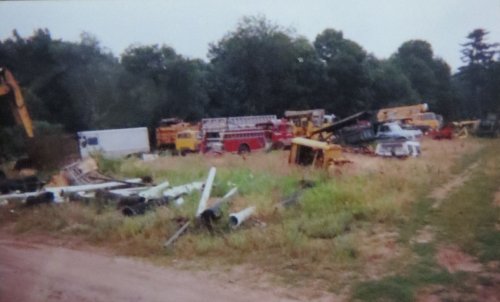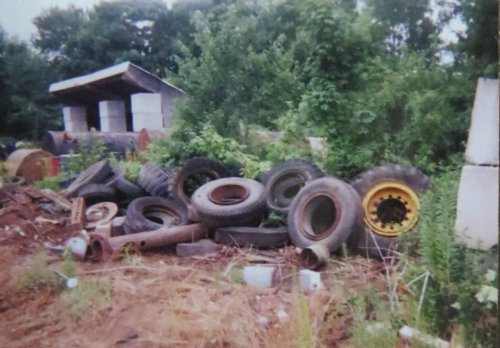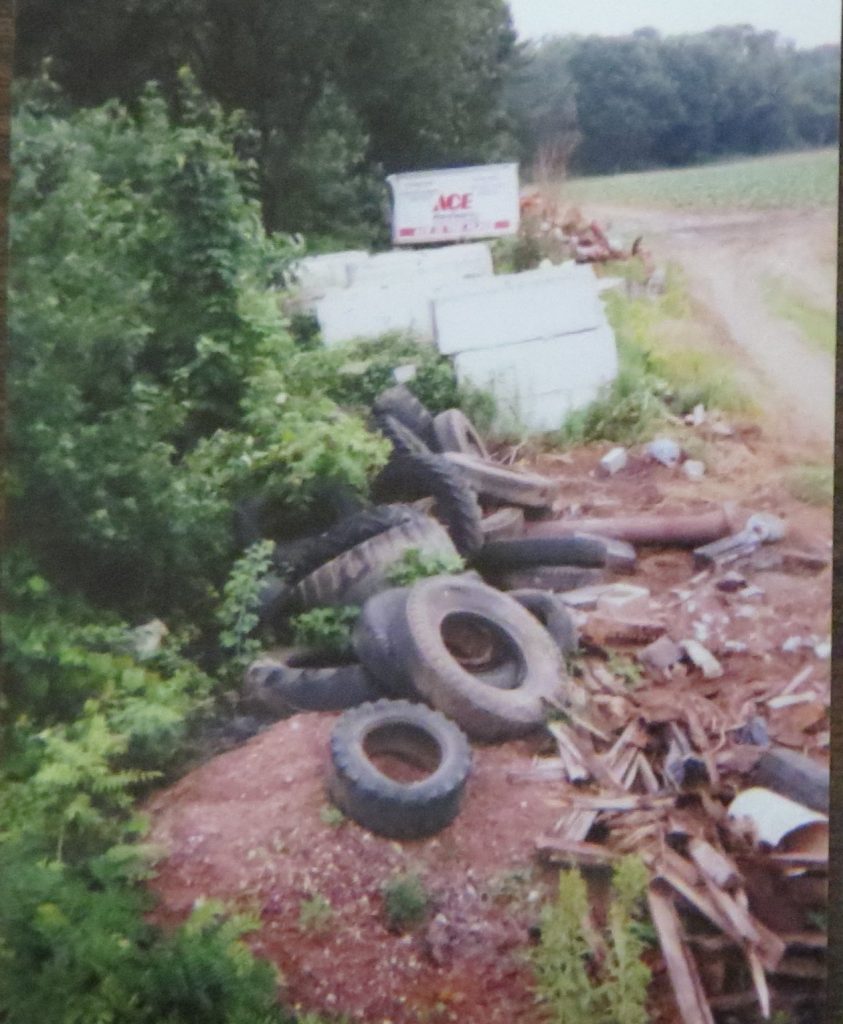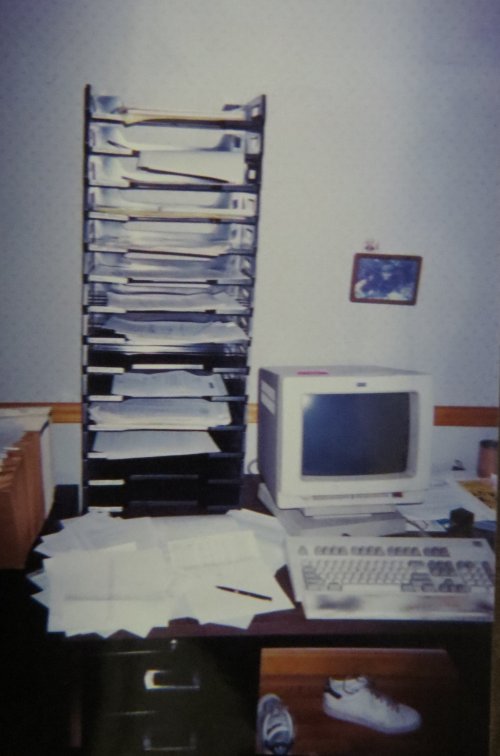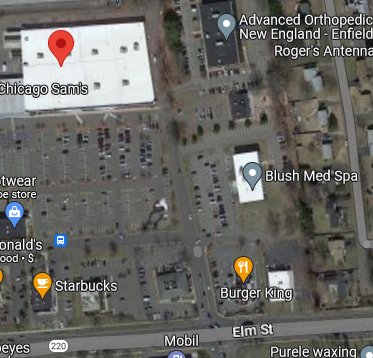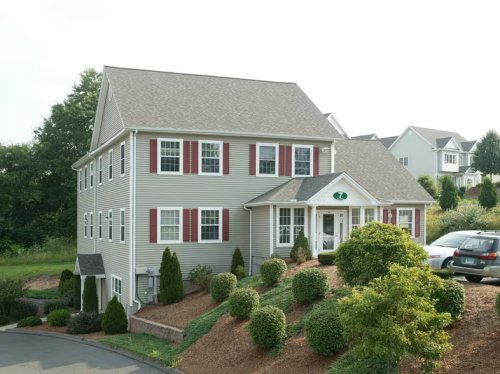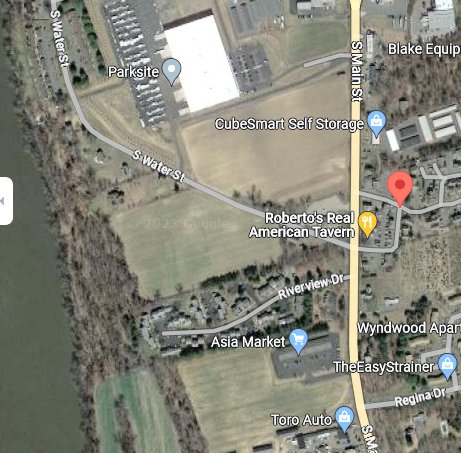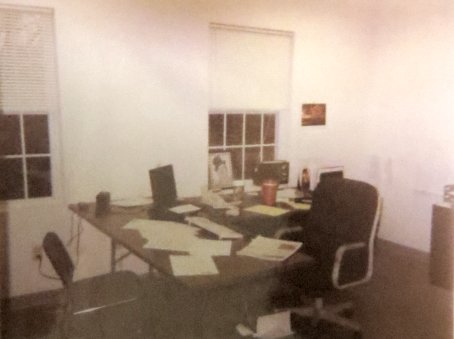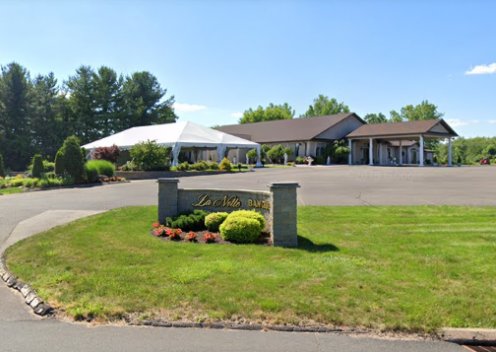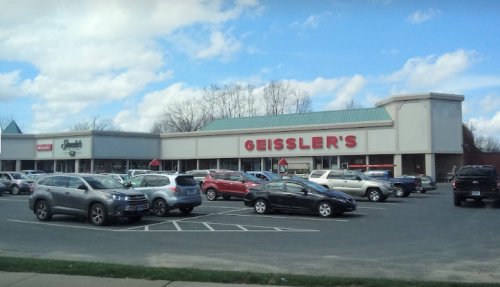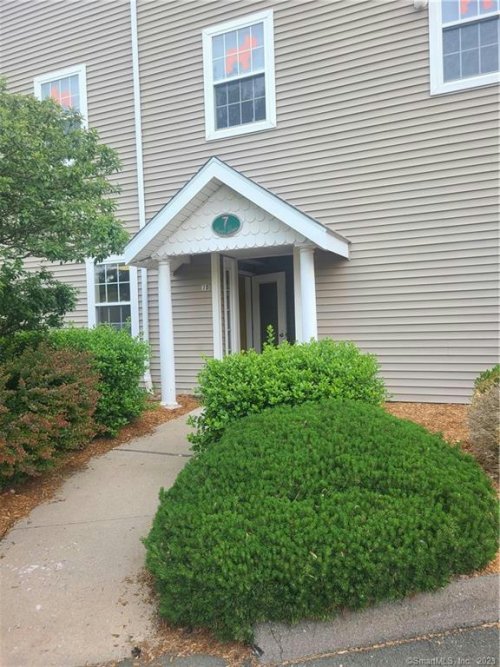Jim Wavada living in New England? Continue reading
Documentation: I found very few notes about the events described in this entry. Sue supplied a few details as well as a book of photos that she had made for my dad. I know from a note on the back of one photo that the move occurred in October of 2005, when my dad was eighty-one years old. It just occurred to me that the transition occurred around what would have been my mom’s eightieth birthday on October 2. That probably also weighed on dad’s mind as he contemplated his future. Most of the following is therefore based on my memory, which may, of course, be faulty.
I should mention in passing that during the entire period our house in Enfield was such a gigantic mess that we never invited any friends over for any purpose.
The problem: In 2005 my dad was diagnosed with macular degeneration. Since he had already lost the vision in one eye to a detached retina1, his vision was quite poor at this time. He still had a car and a driver’s license, but there was no way that he could drive. His doctor had prescribe the recently authorized periodic injections that arrested but did not usually reverse the degeneration. He also certified that dad was legally blind, which was useful for tax purposes. There was virtually no public transportation in the area in which he lived, suburban Johnson County, KS. If he stayed there, he would need to depend on his friends or expensive taxis.
Six years earlier my sister Jamie had cut off contact with my dad, or maybe vice-versa. I could see no reason to involve her in the problems.
I discussed the situation with my wife Sue. She agreed that he should come to Connecticut and live near us. He could live in an apartment for a while. If and when we added on to the house (that project was described here), he could come live with us. I talked with dad on the phone about moving to Connecticut. He was surprised but pleased.
Planning the move: In 2005 I was extremely busy with several monstrous projects at TSI. At the time Sue was no longer working at TSI’s office (explained here). She spent quite a bit of time with her father-in-law, Chick Comparetto. Sue helped dad pick out an apartment. I cannot remember whether he came out to Connecticut. She might have just described the choices to him over the phone. At the time Enfield had a few rather large apartment complexes and a greater number of smaller ones. If the search was expanded to the neighboring towns of Suffield, Longmeadow, Somers, and East Windsor, the selection would be much larger.
I was not involved in this process. I am pretty sure that dad ruled out Bigelow Commons because he could not abide the notion of living in what was formerly a carpet factory. Instead he chose Fox Hill, which was near the corner of Elm St. and Elm St.2
My dad wanted me to come to Kansas City and drive his Ford Taurus back to Connecticut. He knew that my Saturn was pretty old, and he wanted to give me the Taurus, but I did not want it. At the time the Saturn suited my purposes. When I eventually abandoned the Saturn I wanted to pick out my own car. Furthermore, I could not afford to spend several days getting the car to Enfield. So, on my advice he sold it. I don’t know the details.
In addition to his vision problems, my dad also had mobility issues. He had had one hip replaced, and the doctor advised him that the other hip was nearly as bad. After the surgery and therapy he could walk well enough. He could even ascend and descend stairs, but he went slowly and he need a railing.
Living at Fox Hill: Someone helped my dad pack up his belongings at his apartment. He engaged movers to take them to Connecticut. He flew to Bradley by himself. Sue picked him up at the airport.
The movers did not arrive on time. So, my dad and Sue spent an entire day sitting in an empty apartment. I am not sure where he stayed that night. There are several hotels in Enfield.
My dad’s apartment was on the first floor. Since there were no elevators, he would not accept a second-floor unit.
The apartment was not fancy. It had a bedroom, a living room, and a small kitchen. I seem to remember a picture window, too. It was at least two or three steps down from his place in Overland Park.
I had not considered it beforehand, but my dad would obviously need to do laundry. He occasionally brought a load over to our house, and one of use ran them through our washer and dryer. Most of the time he did his own laundry. He mixed everything together in one laundry bag. The closest laundry room was in the basement of another building. He had to walk there, throw his bag down to the bottom of the staircase, walk down the stairs, open the door, and go inside. The hard part was returning. He had to drag his laundry bag up the stairs.
What did he do with the pants and shirts that needed to be hung? He had them dry-cleaned. Either Sue or I took him to the cleaners, probably E-Jay’s on Hazard Ave. It was about the same distance from Fox Hill as our house was, and we drove by it almost no matter where we were going.
The machines in the laundry room at Fox Hill did not accept coins. They accepted only debit cards issued by the office at Fox Hill, which was quite a distance from my dad’s apartment. So, Sue and I would often stop by the office so that he could pay his rent or boost the balance in his laundry account.
Dad stayed at Fox Hill for more than a year, but a little later he felt that the place was becoming dangerous, and he was no longer comfortable living there. He witnessed some mild violence, and he told me that he was sure that there were drug transactions going on. I don’t know if he was right, but he definitely wanted out. I remember that he wrote a letter complaining about an incident that he witnessed and posted it on a website set up for that purpose. Soon after it was posted, several letters praising Fox Hill appeared. It appeared to me that they had all been written by the same person.
Sue once again helped dad find an apartment. I know that they drove to a house in Suffield that was renting a few rooms. He did not like it, but he did like Bigelow Commons when he finally visited it. I took him there to see it before he signed the lease. He asked me what I thought of it. I told him that if this was the same price as Fox Hill, I could not believe that he ever chose Fox Hill. He assured me that it was the same price.
I don’t know what was involved in transporting his belongings to his new apartment.
Living at Bigelow Commons: Dad’s apartment was on the second floor of the southernmost building at Bigelow Commons. There was an elevator just inside the door, and his room was close to both the elevator and the laundry room. He bought a small cart that he could put his laundry in. This was a far superior approach to what he went through at Fox Hill. He also located a dry cleaner that was within a few blocks of Bigelow.
The main reason that Bigelow was not able to charge more was probably because of its location in the middle of Thompsonville. The surrounding neighborhood could be a little rough, but the compound itself seemed plenty safe. If I lived there, I would be worried about my car being broken into or stolen. The parking lot was much more easily accessible than at Fox Hill. That was not a concern for my dad, of course. He did not have a car.
The biggest problem that my dad had at Bigelow was dealing with the windows, which were old and heavy. I could push them up and pull them down without much problem, but that was fifteen years ago. I wonder if I could still deal with them as easily in 2023 at the age of seventy-five.
Dad much preferred the atmosphere and the people at Bigelow. I don’t remember him complaining about anyone there, even the management..
Getting around Enfield: My dad was reasonably independent. I visited him once or twice a week when I was in town. We sometimes ate breakfast at his favorite place, the Farmer’s Daughter Cafe on Mountain Road in West Suffield. It was located in a small strip mall more than twenty minutes from our house. Sue sometimes joined us or took him there when I was out of town.
On most Wednesdays we would eat lunch together at Friendly’s near the Enfield Square mall. We both always ordered the same thing. He had the Senior Turkey Club Super-Melt and coffee. I had the Reuben Super-Melt and a glass of Diet Coke. The waitresses all knew us and treated us like royalty. They especially loved my dad, who insisted on paying and was a big tipper.
I always drove both of us from Friendly’s to Bigelow, but sometimes when I went to pick him up he was already at the mall. He had gone there to walk from one end to the other. He was very proud of being able to do this. He often told me that he thought that he “had a stride.”
How did he get to the mall? Enfield had a free bus service for seniors called Dial-a-Ride. He would call in to make an appointment. The bus would pick him up at the parking lot near his door and take him to the doctor’s office or any other location in Enfield.
It was a terrific service for seniors, and my dad definitely appreciated it. When you called for an appointment, you could specify the time and destination, but you could not specify the driver. My dad did not appreciate one of the bus drivers, who insisted on proselytizing his right-wing political views willy nilly to all the passengers. My dad complained about this guy almost every time that we were together.
Trying to read: After he retired my dad enjoyed four pastimes above others—golf, travel, reading, and writing. He played a lot of golf in the early years with my mom or with some friends. His hip and vision problems eliminated his favorite form of exercise, and I could not name what was second.
When mom was alive they traveled some together, but after her condition deteriorated it was difficult. After she died my dad took two big trips, one to France with a group of strangers who were part of a Catholic group and one to Ireland with Cadie Mapes, his granddaughter. I don’t know how much he enjoyed either trip. What he could get out of them was severely limited by his poor vision and his mobility issues. I know only that he loved the side trip to Normandy and had trouble getting along with Cadie in Ireland. The only trips that he made when he was living in Enfield were when dad and I attended two funerals in Trenton, MO. They have been described here.
He was able to write three books after he retired, and he was a voracious reader while he still had one good eye. The one thing that he really wanted while he was in Enfield was to be able to read books, magazines, newspapers, and the labels on items at stores. A fair amount of the time that we were together were attempts to help in this regard.
I had heard somewhere about machines that helped people with poor vision by projecting on a computer screen a greatly magnified version of something printed using closed-circuit television. We made an appointment to see one of these machines at a store in, if I remember correctly, Cheshire, CT, which was a drive of over an hour from Enfield.
For some reason we had to wait for fifteen or twenty minutes before someone could help us. There was little to do while we waited. The store had some magnifying glasses and a hand-held electronic magnifier, but that was all except for the CCTV machines.
Finally someone was available to demonstrate how the system worked to my dad. He (or maybe it was a she) sat my dad in front of the machine and asked him to look at the screen. Meanwhile he had to manipulate the magazine, which was a few inches under the camera. My dad had been trying to do this for less than five minutes when he became physically ill. The combination of the reading and the maneuvering of the text for some reason made him nauseous.
The salesperson and I had to help him to another chair away from the machine. It took him more than fifteen minutes to regain his equilibrium. The salesperson insisted that he would get used to it, but there was no sale on that day. Dad later purchased one of those hand-held magnifiers. He brought it with him to stores
On the way back to Enfield my dad confided to me that he had never vomited in his life. What? He was in the army in the Pacific. He must have gotten some bad food or bad hooch, right? And he worked in advertising for decades. He must have had one too many at least once, right?
No, I believe him. He was a unique person. He also told me that he had never had a dream, or at least he had never awakened remembering his dream. That may have been true when he told me, but I am almost certain that he had a real doozy later.
I knew how important newspapers and magazines were to my dad. I contacted an agency that provided special radios that had someone reading articles and stories from newspapers all day long. I got one for him, and he used it for a while. I also purchased some audio books for him and kindle books that he played on his computer. I remember that I came up with a trick on Kindle that worked until they upgraded the software. I complained about it, but whoever I dealt with insisted that the feature that I employed was unintentional and would not be added back. I don’t remember the details.
Writing was another story. He had never learned to type. So, even when his vision was not too bad, he struggled with typing on a computer. I adjusted the font size of his screen so that when he wrote something it was very large. However, he was also not adept at moving the cursor around on the screen. There really was no way for him to write much or to edit what he had written on the computer. Mostly he just sent me emails. He was definitely frustrated by this.
Errands: I don’t think that I ever took my dad to see any of his doctors. He generally took the Dial-a-Ride bus or asked Sue to take him. However, I often brought him to other places. Our first stop was usually the ATM at Webster Bank to withdraw cash. This was the only use that he made of his debit card. He had plenty of spending money. He had a good pension from BMA in addition to Social Security and interest on bonds. His expenses were low, and he had excellent health insurance to supplement Medicare. When he died in 2011 I discovered that his financial situation was better than I had guessed.
If I came to see him in the morning, which I did every Sunday, I stopped at McDonald’s and picked up a sausage biscuit with egg sandwich and a senior coffee for him.
We almost always stopped at Stop and Shop. He liked the salad bar there. Although he seldom consumed anything that was green besides string beans, he filled up a large container with fruit. He always paid cash, and he never bothered with coins. When he got back to the apartment he put all the change in a big bowl.
Another common stop was CVS to pick up extra-strength Tylenol for his arthritis. I tried to convince him that Tylenol had only one active ingredient, acetaminophen, which could be purchased much more cheaply under the store’s label. He would have none of it. He was loyal to brands that worked for him. I am like that to some extent, but when it comes to drugs that must list all of the active ingredients, I go for the cheap ones that do not waste money on advertising. Especially if there is only one ingredient.
My dad printed out emails that were sent to him because it was too difficult for him to read them on the screen. I set it up for them to be printed using a very large font. Consequently he went through quite a bit of ink for his HP inkjet printer. The ink cartridges for these printers were nearly as expensive as the computers themselves. I discovered a place on the Internet where one could purchase ink for the cartridges. It was possible—but not easy—to refill empty cartridges. I did this for him for a few months. Eventually it upset him to see me spending time doing this, and he asked me to just buy him new cartridges.
After his Kansas driver’s license expired he needed to obtain an official Connecticut ID. I think that Sue helped him with this. It involved as much rigamarole as obtaining a driver’s license, maybe more.
I took dad to church every Sunday. When he lived at Fox Hill, although other churches were closer, he went to Holy Family church3 on the south side of town.
After he moved to Bigelow Commons he went to St. Adalbert’s, which was just a few blocks away from his apartment. Quite a few steps led from the sidewalk to the church. After a while he needed to use the elevator.
I would let him off, do something for a half hour or so, and then drive back to the church to pick him up. He never tried to persuade me to join him.
Every so often my dad sent me a list of groceries to order for delivery to his apartment. At first we used Pea Pod to order from Stop and Shop. When Geissler’s expanded its delivery area to Enfield, we switched to them.
Finances and taxes: Dad wrote his own checks, but he was utterly incapable of balancing his checkbook. I had to take over that responsibility before he even moved to Connecticut. I don’t remember how he provided the information to me. Maybe I did it on his computer.
I also did his taxes. They were very easy except for the first year in which he had to file in both Connecticut and Kansas. He always paid on time. I remember that for some reason he had a dispute with the IRS about his pension, which had been passed from one insurance company to another after he retired. He was upset at the insurance company more than the IRS. He was greatly relieved when the whole mess was straightened out in his favor.
I don’t know if he worked with a lawyer on this, but his personal affairs were in excellent condition at the time of his second fall.
Visits to the Lisellas: My dad naturally wanted to visit his grandchildren, all of whom were living in nearby West Springfield, MA, as much as possible. My sister Jamie was living elsewhere (explained here), but her ex husband Joe Lisella and his new wife Jenna (who was thirteen years younger than Jamie), seemed happy to involve dad, as well as Sue and me, in holidays and other events.
I don’t know if my dad enjoyed these occasions or not. He was much more sociable than I ever was, but the whole thing was awkward for him. Divorce was unheard of in his family, he did not know any of the other adults in attendance, he could hear but not see what was going on, and once he parked himself in an easy chair, it was hard for him to get up. The kids, especially Gina, treated him well, but he was obviously uncomfortable. I was, too.
I don’t remember any of them visiting my dad until his last days after the second fall.
Miscellaneous memories: My dad and I sometimes watched college football games together on his plasma-screen television4. He actually listened more than watched. I remember that he used the television for several months before we realized that it was not set to show high-density programs. A simple adjustment greatly improved the viewing, at least for me.
Sue tried to involve dad in the senior social life in Enfield as she had for Chick Comparetto. Dad did not think much of Chick, but he liked some of the other people.
My dad was not much of a cook, but he used his George Foreman grill to cook steaks and chicken fillets. He loved it when we took him to a restaurant for supper. He could not read the menu, and so he usually ordered Chicken Alfredo.
Dad and I had a long-standing argument about who was the worst president of all time, Richard Nixon or George W. Bush. He said that it was Bush because he had attacked Iraq even though Iraq had done nothing to the U.S. I claimed that it was Nixon because of his needless extension of the Vietnam War, his secret war in Laos, and his overthrow of the democratically elected government in Chile.
I may have been prejudiced because Nixon was president when I was drafted. I always suspected that dad had voted for Tricky Dick in 1972 and was therefore sheepish about criticizing Nixon’s presidency. I admit that I had no direct evidence, but I remembered how vociferous he was about Nixon’s deviousness when he ran in 1960, and I know that dad supported the War in Vietnam until the publication of the Pentagon Papers,
The first fall: I think that the first fall happened in late 2010 or early 2011. My dad was in his bedroom. He might have been going from his bed to the bathroom, a distance of a couple of yards, when he fell. The lights must have been off because he was not able to get to his feet and he was disoriented enough that he ended up in the closet.
At some point on the following day the delivery man from Geissler’s knocked on the door. When no one answered, he contacted someone at the office. They did a wellness check and found my dad in some sort of pitiable position. An ambulance took him to Johnson Memorial Hospital on the far west side of Stafford. They called me to tell me what happened.
I visited him in the hospital several times. I never was certain what exactly was wrong with him. He could not walk, but when I asked the doctor what was preventing him from walking, he just said that that was a good question.
The doctor was most concerned about dad’s mental state. My dad had told him that he had been in Milwaukee with some friends of his. The doctor, of course, thought that he was hallucinating. I told him that a more likely explanation was that he had dreamt about being in Milwaukee, he remembered the dream, and he was unable to disassociate it from real experiences because he no practice at doing so. I do it almost every morning, but he claimed that he had never had a dream.
The doctor also asked if he was reckless. He was afraid of releasing a man with poor vision and mobility to live by himself. I assured him that he was the most careful person whom I knew, and, if anything, he was paranoid about fire, getting mugged, and other potential hazards.
After a few days he was walking behind a walker. He never did regain the ability to walk without one. The doctor told me that he would release him, but they wanted him to go to a nursing home for a while. They asked me to select the one that they would release him to. I picked Blair Manor5 on Hazard Ave., a few miles from our house. I knew nothing about nursing homes. I just picked the one that was closest to our house.
My dad’s stay at Blair Manor was not a happy one. On my first visit he was having paranoid hallucinations. He informed me that the nurses were trying to kill him, and instructions to them were being broadcast over the television. At the time Meet the Press was on someone’s set within earshot. I tried to calm him down, but he just got frustrated that I—of all people—would leave him in this perilous situation.
I talked to the nurse about this episode. She said that he had been taking some drugs that could cause such symptoms. She said that she would report it to the doctor. She did, and he altered the dosage, and dad was all right after that. It shook me up pretty thoroughly.
Dad later asked me if he had made a fool out of himself. I said, “No, powerful drugs prescribed by your doctor made you act like that. The nurse said that it happened frequently.” Even so, he hated the place and wanted to depart as soon as possible. They finally let him depart. I brought him to his apartment. The people at Bigelow Commons were very happy when he was able to return.
I don’t know how long the period was during which he needed his walker to get around. I remember going to Friendly’s quite a few times.
The second fall took place in August of 2011. It was shortly before his 87th birthday, which was on August 25. On this occasion he fell down in the laundry room. He used his wheeled laundry cart as a walker when he did his laundry. Someone found him there unconscious. An ambulance took him to Hartford Hospital.
Early the next Sunday morning I got a phone call that we should hurry to the hospital. Sue and I rushed there. The nurse said that she did not know why the doctor had ordered that such a notice be sent. Dad was still unconscious, but the nurse said that there was no imminent danger of him dying.
A few days later the doctor in charge told me that his systems were “just worn out”, and he should receive palliative care. It could be at the hospital, at a nursing home, or at a house. I told them that we would not be able to do it, and I could see no reason to move him to a nursing home. So, he stayed at Hartford Hospital. I visited him every day, but he never communicated.
Some of the Lisellas came by on September 12. They were shocked and saddened by his appearance. He died on September 13, 2011.
The story of his funeral and other arrangements has been posted here.
1. I have never been quite certain how the retina became detached. He only talked about it one time. He blamed it on a surgeon who apparently performed cosmetic surgery on his eyelids.
2. This looks like a typo, but it isn’t. Westbound Elm St., a major four-lane road (CT 220) north of Enfield Square Mall, makes not one, but two right turns at intersections where the road itself continues onward. It then strangely transforms itself into North St. where the latter appears on its left.
3. In 2017 St. Bernard’s and Holy Family merged to form one parish called St. Jeanne Jugan Parish. In 2022 St. Martha’s and St. A’s also joined. I guess that the administrative offices were at Holy Family. The schools were at St. Bernard’s. There was also a church in Thompsonville called St. Patrick’s. It had previously merged with St. A’s. I think that all five churches were still open in 2023.
4. We still have that television in 2025. Sue watches it in bed when I have gone to sleep.
5. Blair Manor was closed in 2017. It was subsequently converted to “assisted living” apartments.

